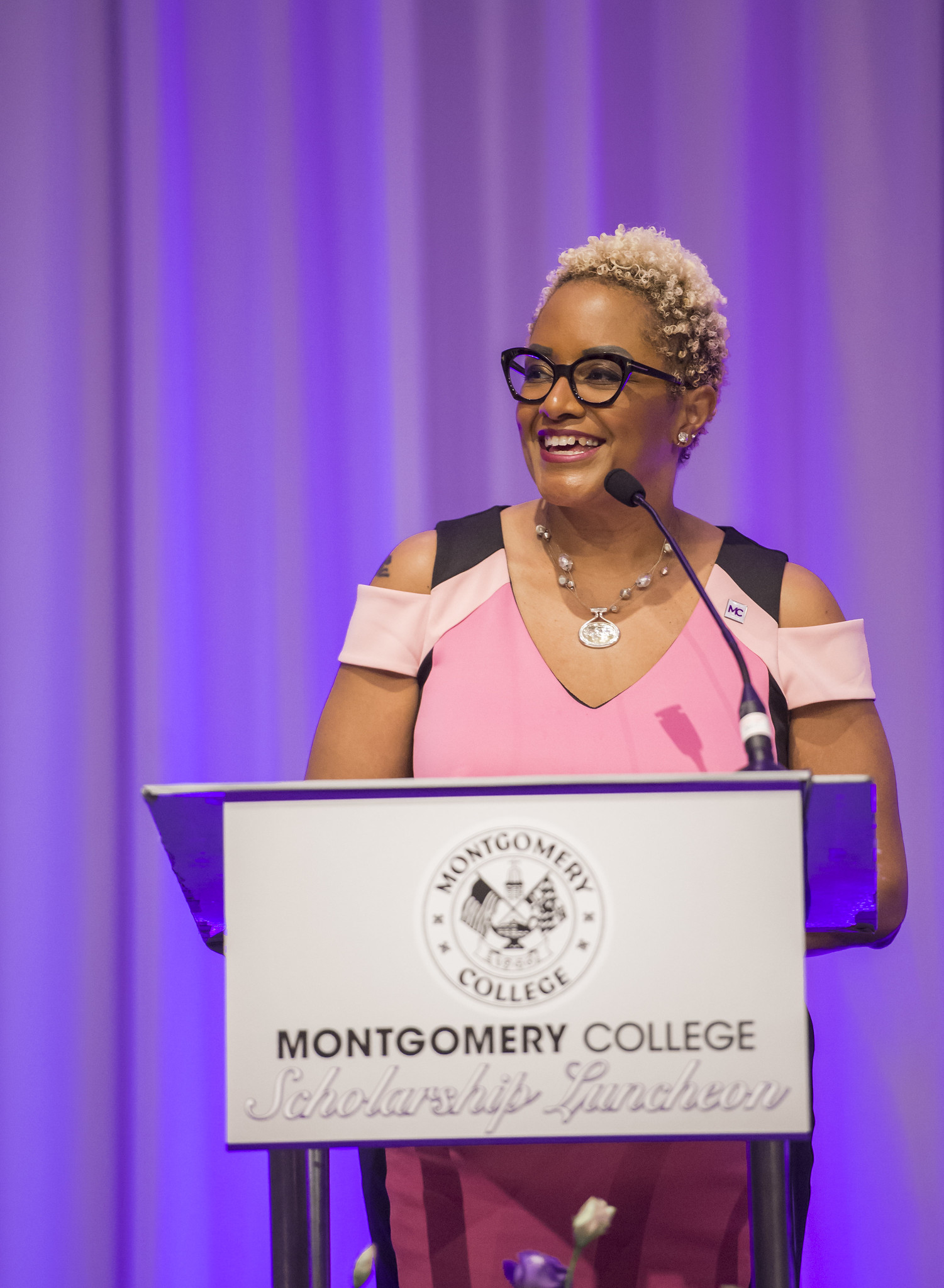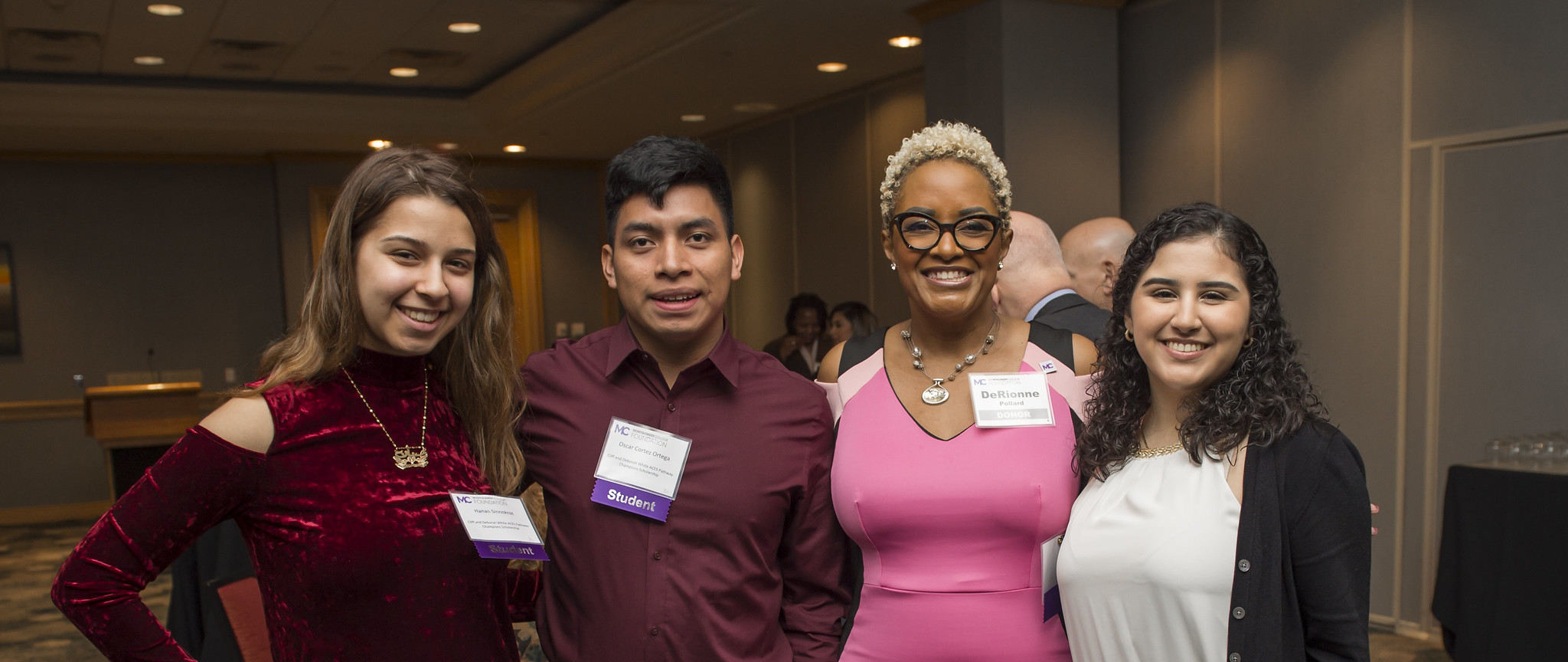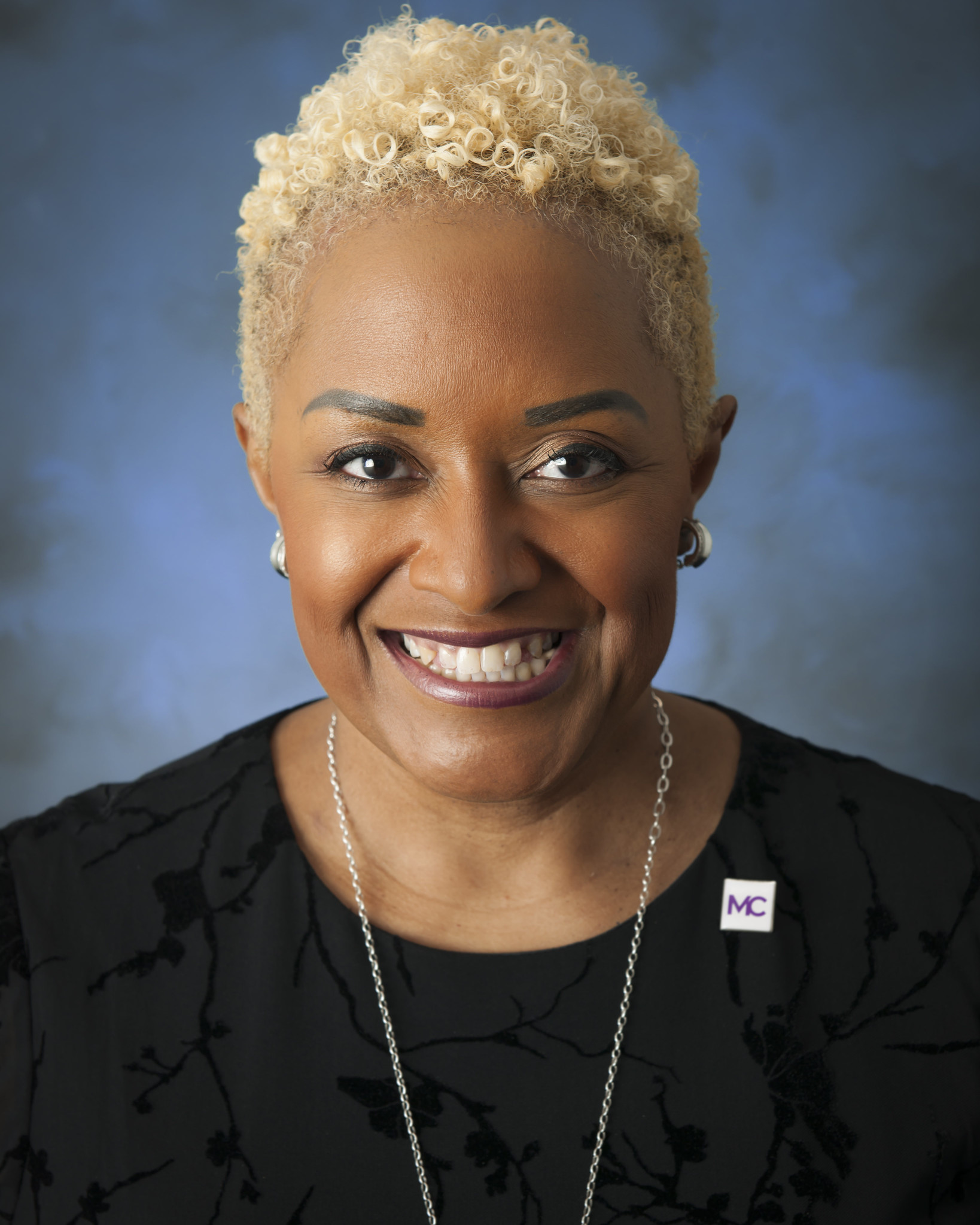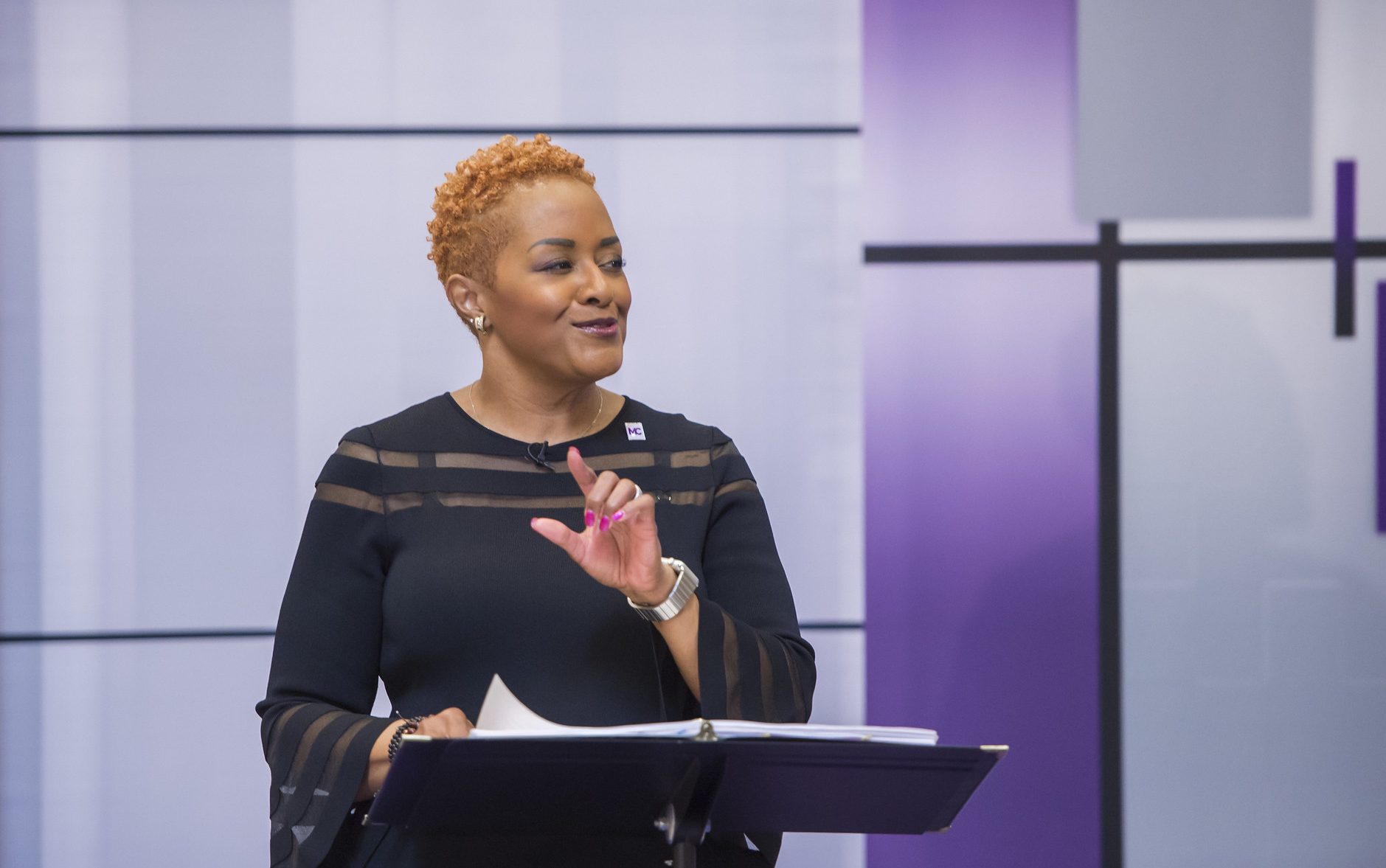Icy winter winds slice through the streets of a South Side Chicago neighborhood. Bundled in layers of protective gear, people everywhere scurry to their destination before the chill settles into their bones. Everyone, that is, except for a young girl wearing a coat, a proud smile—and no gloves.
Like many kids, DeRionne Pollard (’93 English, MA ’95) lost many gloves when she was growing up. “At one point, I lost four to five pairs in two weeks’ time,” Pollard said.
But the Pollard family struggled with limited resources, which made one missing glove a pretty big deal and a source of frustration for Pollard’s father.
One frigid day in particular, Pollard noticed a classmate walking without her hat or gloves.
Pollard was aware that this girl’s family struggled financially, too. Without a second thought, she offered the girl her own hat and gloves. Despite the potential repercussions of returning home—once again—with only one glove, she knew it was the right thing to do, and she hoped that her father would understand.
She was right. Her father wasn’t angry. He was proud.

“I remember that look of pride and compassion on my father’s face,” said Pollard. “He said, ‘Baby, you can always do that when you need to. We are all in this together, and no one should go hungry or without gloves.’”
Those missing gloves served as reminder of Pollard’s lifelong commitment to serving others, social justice and equity.
“My personal philosophy is that social justice is the ultimate expression of the Golden Rule,” Pollard said. “I want everyone to be able to live in a community that values social justice—a community that treats them as worthy and works collectively to remove barriers toward mutual success.”
A road to radical inclusion
Pollard mirrors the support and compassionate role modeling that she received so freely during her childhood, throughout all aspects of her role as the president of Montgomery College—the largest community college in Maryland. With an audaciously innovative agenda, she challenges the college’s faculty, staff, students and the surrounding community to weave social justice into everyday life.
“We’ve thought a lot about the fact that social justice is the extension of the mission of the community college. For us at Montgomery College, we name it boldly and then lean into it. We work deliberately to have policies that are inclusive and meet students where they are,” Pollard said. “We provide the same resources to highly prepared students and to first generation students who may live in poverty but do not believe they want to live that way when they die.”
Just one year into her role as president, Pollard drove the development of a dynamic plan, initiated in 2012, which put a laser focus on diversity and inclusion. The college’s values statements lead with “…radical inclusion-that is, deeply rooted values of welcoming all individuals who seek higher education or continuing education-is an essential element of our identity.”
In a recent address to internal stakeholders, Pollard reflected on how students embraced their role in social justice.
“It is pretty clear that our students are focused on social justice,” she said. “They’re even using their skills to improve the conditions of people in other nations. I don’t know what that says to you, but that is pretty powerful. They’re tackling problems that require shared solutions at a global level. And these stories say so much about our students and who their hearts are and what their passions are, in these days and times.”

Pollard’s impact has reached hundreds of thousands of students. Throughout its three campuses, Montgomery College serves nearly 56,000 students each year. In addition to its status as the largest community college in the state, the student population is incredibly diverse.
“We are gloriously diverse as a community college, with 72% of our students identifying as non-white,” she said. “We have continued to be the first choice for immigrants and first-generation college students in the community.”
A small sample of the milestones that she has accomplished while leading the college includes: Increasing graduation and transfer rates, establishing a 1,700-member coaching program to provide underserved high school students with a pathway to a college degree and tripling the college’s grant-funded research.
Learning is a life-long journey
As a student at Iowa State University, Pollard honed a diverse set of skills and experiences. A true student and scholar of the liberal arts, she explored problem solving, strategic thinking and collaborative communication. She also sharpened her critical-thinking skills.
“Iowa State left me well-prepared academically, but also taught me how systems work,” Pollard said. “I understood how to make things happen. I had to understand the politics and culture and subculture and the nuances of educational delivery. All of these things work really well together, and I feel more confident and grounded because of my educational experience at Iowa State.”
As chief of staff for student government, she learned how to maneuver and lead systemic change.
“My personal philosophy is that social justice is the ultimate expression of the Golden Rule.”
Pollard continues to learn and grow as she gives her time to the community. She has infused her personal and professional expertise into countless organizations that have benefited from her generosity. Pollard serves on boards for the Montgomery County Chamber of Commerce, the Tech Council of Maryland, the Strathmore Arts Center and O.P. Jindal Community College in India.
However, her tenure on the board of Generation Hope, a nonprofit human services agency, demonstrates her passion for and commitment to addressing large, complex issues with a multi-pronged approach.
Nicole Lynn Lewis, founder and CEO of Generation Hope, notes that Pollard was one of the first people to believe in the vision of this non-profit organization.
“Doctor Pollard joined the board when we were a very young organization, and her wisdom and understanding of the higher education-landscape were essential to Generation Hope’s growth," said Lewis. "Her heart is tied to the students who are facing the most challenges and who are often left behind. Her values inspire me to always have the same passion,” said Lewis, the founder and CEO of Generation Hope.
Generation Hope reduces poverty by providing services and support to teen parents—such as mentoring, early childhood development services and scholarship support. These programs and services are designed to help teen parents begin college or complete a degree that they’ve started, to help lift them out of poverty.

“Generation Hope looks deeply at how to create opportunities for parents who are college students,” said Pollard. “This is a population that is forgotten and is a two-generation solution to poverty.”
Self-prescribed legacy
Pollard’s passion, selfless actions and leadership have earned her the following honors: Washington Magazine’s 100 Most Influential Women in Washington, D.C.; President Barack Obama’s Champions of Change award and the Carnegie Corporation of New York’s Academic Leadership Award. In early 2019, she was awarded the Iowa State University Distinguished Alumni Award, the highest honor given to alumni by the university.
Although she is grateful for the accolades and recognition, Pollard finds that her biggest rewards are in her community and at home with her wife Robyn, whom she met at Iowa State, and her son Myles.
“I don’t want my tombstone to say ‘phenomenal college president,’” she said. “I want it to say, ‘She was a loving parent, a dedicated spouse, loved good tequila and was a phenomenal girlfriend.’ You have to know who you are and commit to preserving that.”
